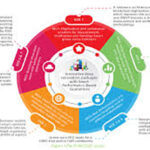English: Mobbing (also known as workplace bullying)
Mobbing refers to the persistent psychological harassment or hostile behavior directed at individuals in the workplace—whether colleagues, subordinates, or even superiors. While the term originates from the English-speaking world, in many countries (especially in Europe), mobbing has become a specific term for repeated negative actions that undermine a person’s dignity, performance, or mental well-being at work.
Characteristics of Mobbing
Mobbing may involve:
-
Verbal abuse or humiliation
-
Social isolation or exclusion
-
Unfair criticism or sabotage
-
Spreading rumors or false accusations
-
Withholding important information
-
Undermining an employee’s tasks or responsibilities
The behavior may be intentional or stem from neglect or poor management practices, but in either case, it leads to a toxic work environment.
Mobbing differs from isolated conflicts in that it is systematic and sustained, often lasting for weeks, months, or even years. The psychological damage can be significant, resulting in stress-related illnesses, reduced productivity, and eventual withdrawal from the workplace.
Legal and Organizational Response
In many jurisdictions, mobbing may fall under laws related to workplace health and safety, discrimination, or psychological abuse.
Organizations are encouraged to implement:
-
Anti-mobbing policies
-
Confidential reporting systems
-
Employee support services (e.g., counseling or coaching)
Proactive leadership and organizational culture are critical in preventing mobbing and maintaining a respectful, inclusive work environment.
« Back to Glossary Index





![15 Employee Offboarding Templates That Save Hours of HR Time [Free Downloads] 15 Employee Offboarding Templates That Save Hours of HR Time [Free Downloads]](https://i1.wp.com/www.hrcloud.com/hubfs/Header.png?w=150&resize=150,100&ssl=1)
